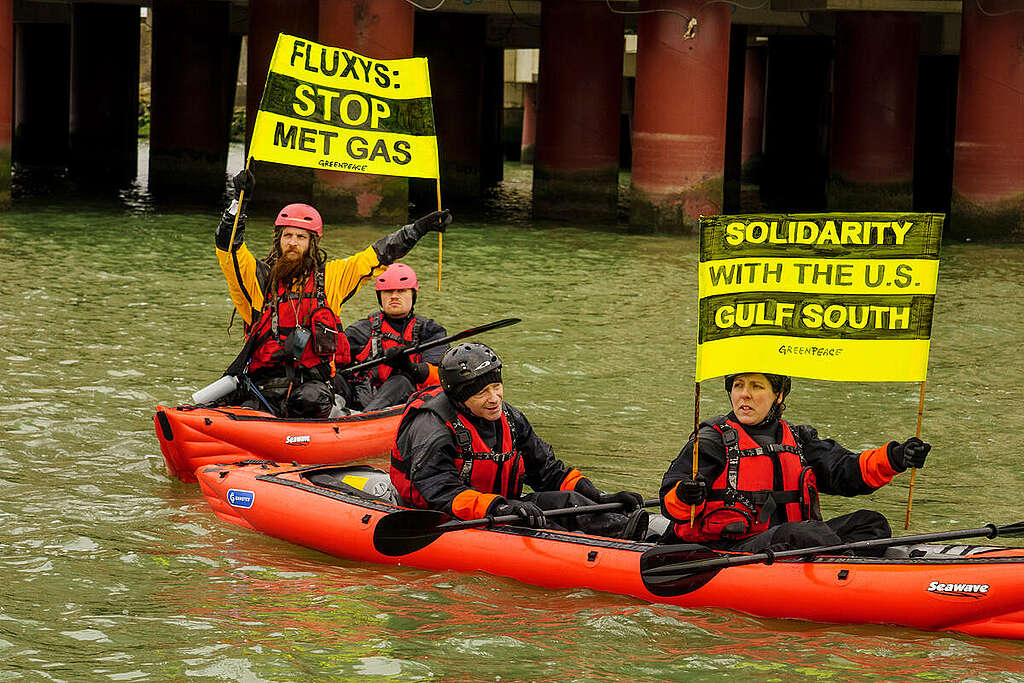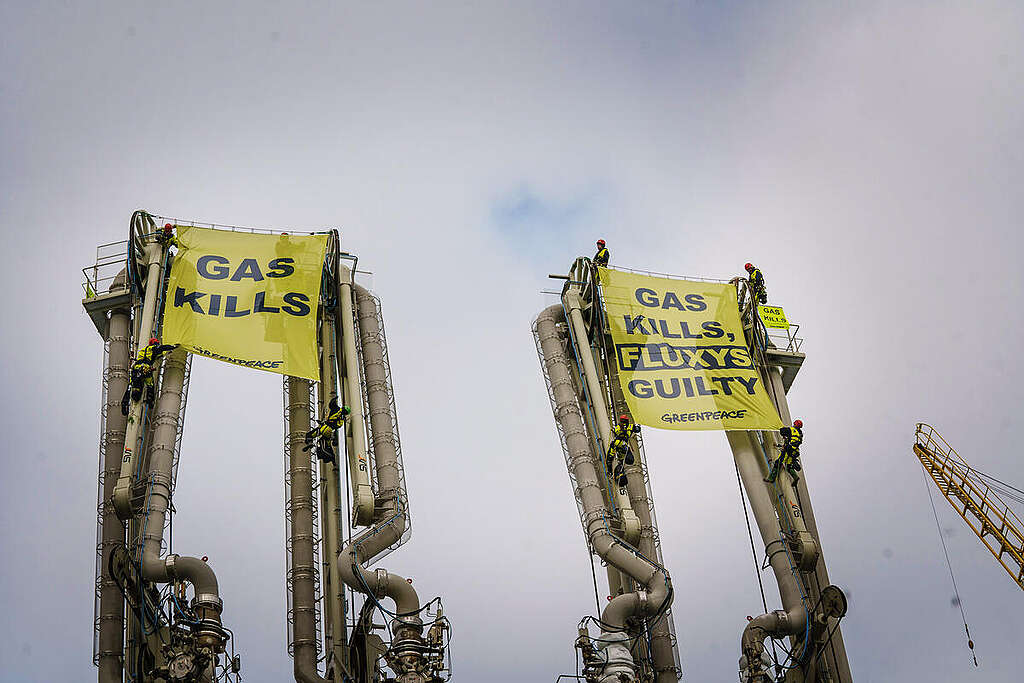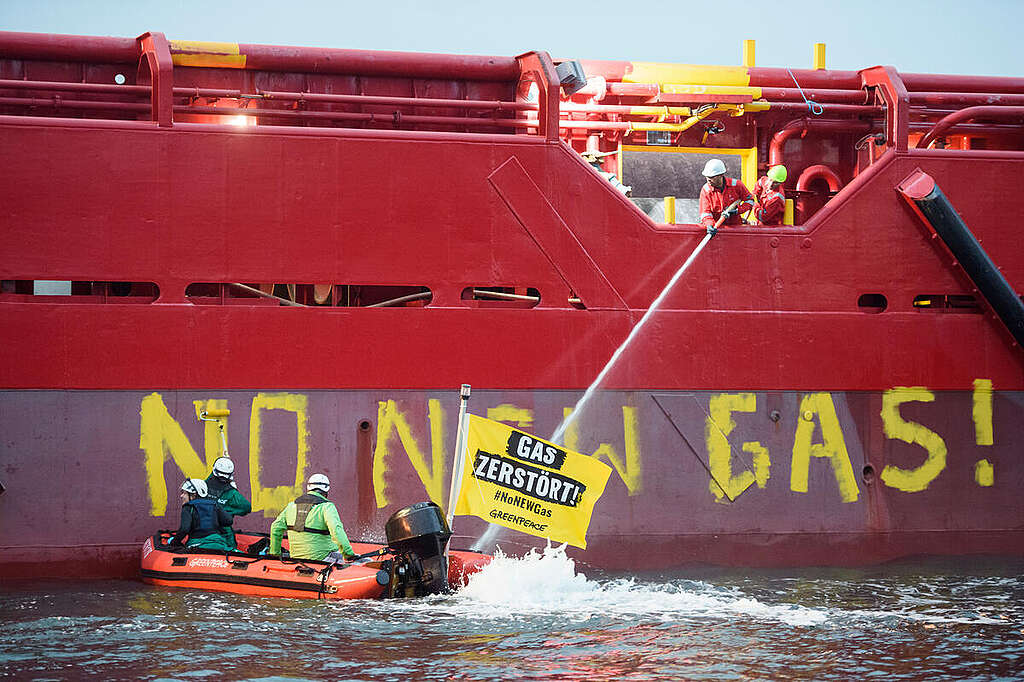On 29 April in Zeebrugge, Belgium, 22 activists took part in a peaceful action against LNG transport company Fluxys, to denounce their recent increase of US liquefied gas transports into Europe.
Now, 14 of these activists are facing prosecution. In this interview, activists Nina, Juri, Kelly and Paula talk about their experience taking part. Nina and Jura were two of the climbers who scaled the gas terminal, while Paula piloted the boat that transported them to it, and Kelly handled the social media posts about the action.
All four appeared in court again on the 4th of October.

Tell us about your arrest – what happened?
(J) After blocking the terminal for a few hours and with the action having achieved our goal, we descended voluntarily. But there was a significant police presence; we had to identify ourselves and then officers took us to the police station. At that moment in time, I didn't expect to have to spend two whole days in a cell.
(K) An activist on our boat contacted the police as soon as the action began to tell them what we were going to do, and reassure them that the action would be peaceful. I was so busy with my work that I didn't realise we were going to be arrested. I was in an escort boat, and we had to follow the maritime police to shore in order for them to handcuff us.
You were held for 48 hours. What happened during those two nights and how did you feel?
(P) It was confusing because the police didn't speak English, so I wasn't sure on what grounds I was being arrested. At first, the police were very brusque. They limited the amount of water we could have. They refused to flush the toilet as often as necessary. We also had to put up with their cigarette smoke. But luckily I was surrounded by extraordinary women.
(J) After taking my fingerprints, a personal description and photos, I was taken to a cell with other Greenpeace activists. There was no clock, so it was very difficult to keep track of time. The neon lights in the cell were on 24 hours a day, even at night. I had the impression that the way we were treated varied greatly depending on the police officers present. The power imbalance was truly alarming. After exactly 48 hours, the maximum period of detention under these conditions, we were interrogated and allowed to leave. Members of Greenpeace Belgium were waiting for us. I was so happy to be able to shower, go to the toilet with the door closed, wash my hands and brush my teeth. I think that compared to other people who were under police guard, our group did not experience the worst. Still, it was quite a stressful experience for me.
(N) At first, I thought we would only have to stay a few hours and that we would be released at the end of the day. We had no information about what would happen. I was shocked that they ended up holding us for 48 hours and treating us like criminals. I think the police wanted to discourage us from continuing our actions. It was my first time in a cell. It is a very heavy feeling to lose your freedom and be exposed to police arbitrariness.
Do you regret those two nights?
(N) No regrets at all! After two nights in prison I feel stronger than before. The action received a lot of media attention and raised public awareness about this pressing issue. So, for me, it was worth participating.
(J) No, I don't regret being a climate activist at all. I don't want this kind of oppression to stop us from fighting for a future and a liveable climate.
(P) I regretted eating so much sugar during the action! We weren't able to brush our teeth for hours… But I don't regret participating.

Do you think these kinds of actions are important?
(N) It's the only option that remains. The warnings of scientists about the climate crisis have long been ignored. Those who take to the streets to make others aware of the urgency of the situation are not listened to. If we want to change things and promote effective climate action, we need to do just that. Actions are important because they show that people are resisting the government's failure to take action.
(J) We need to stop treating the symptoms and address the underlying causes. LNG (liquid natural gas) - a fossil fuel - continues to fuel climate change. The consequences of this climate crisis are catastrophic in the Global South. In addition to this environmental damage, there's also a social component. People living in LNG-producing regions suffer the consequences, especially in terms of their health.
(P) Some companies are allowed to carry out activities that are harmful to the people living near the extraction areas. We are aware of the consequences. Unfortunately, these companies are not listening and that's why we must take action.
Why did you want to take action for the climate?
(J) I can't stand 'business as usual' anymore. We've known about climate change for decades and we know it's a growing crisis. Scientists have been saying for years that urgent action is needed. We feel the consequences more and more, but at the same time people bury their heads in the sand.
(P) I'm taking action because I want to be able to say that I really did everything I could to stop the inevitable global destruction looming on the horizon. I have the privilege of being able to act, and with that privilege comes a degree of responsibility.
(K) I want a liveable future. I don't think we pay enough attention to big companies. We tell people to turn their heating down one degree, but that really doesn't get us where we need to be. We need to focus on the people who are making money from this crisis.

How do you feel about the fact that you are being prosecuted for participating in this action?
(P) I'm not naive, I knew this was a possible outcome. But it is sad to see that the justice system continues to prosecute people who try to protect others, while sparing the people and companies that harm others.
(J) We're prosecuting the wrong people. Yes, we climbed onto an LNG terminal. But we're in the middle of a climate crisis! The real "criminals" in this case are those who cling to fossil fuels and refuse to acknowledge the multiple crises we find ourselves in.
(N) I'm disappointed. I'm shocked by their reaction and by the fact that they are really trying to intimidate us and deny us the right to protest. And I'm angry that climate criminals like the polluters who are responsible for the climate crisis can continue without any problems. But we, who are concerned about the future and take action for the climate, are taken to court.
Show your support for Nina, Juri, Kelly and Paula by sharing this story and expressing your solidarity with all the activists who oppose the fossil fuel projects that threaten our future. Together, we will show Fluxys and other polluters that we will not be intimidated, and the climate movement will not be muzzled.
Ilse Nollet is Head of Communications for Greenpeace Belgium.






